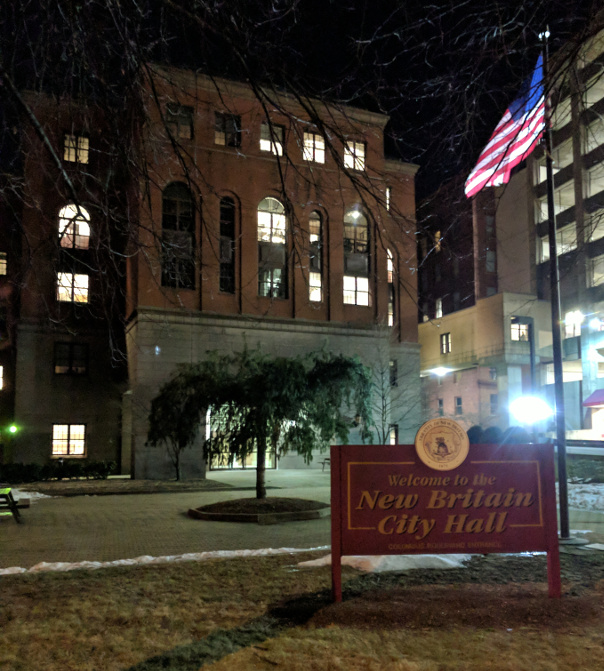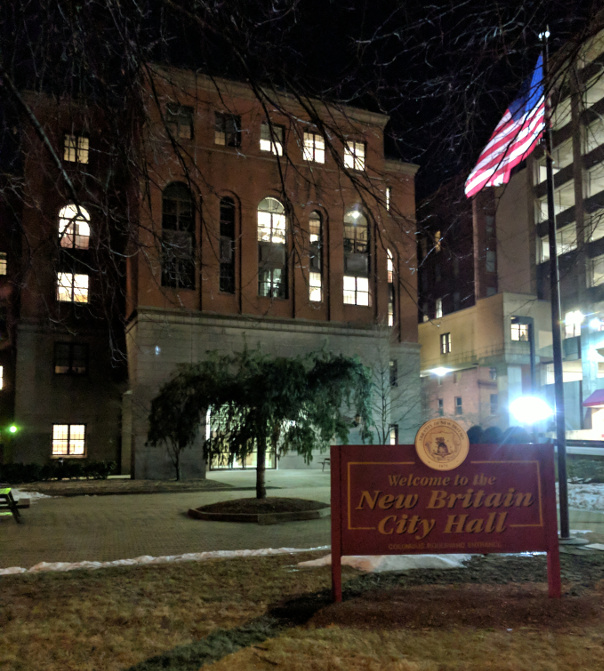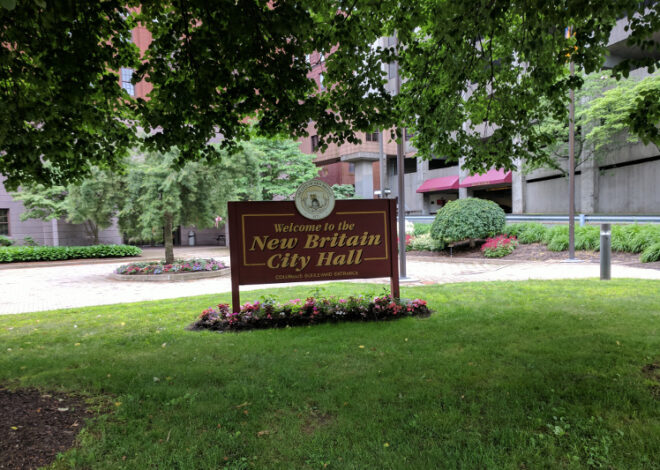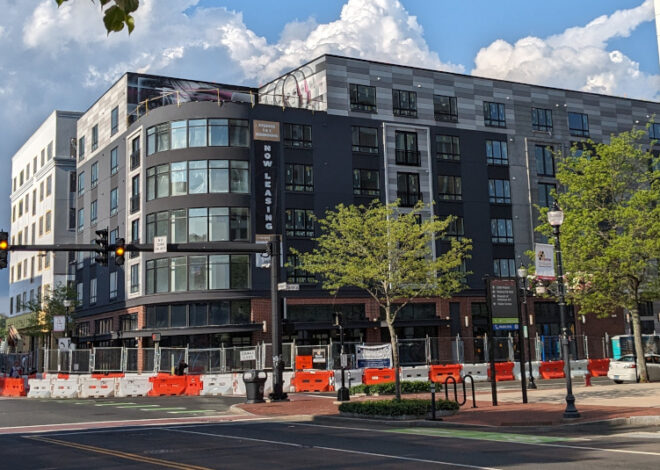With a resolution to rename Paul Manafort Drive to Ebenezer D.C. Bassett Way back before the City Council after a veto by Republican Mayor Erin Stewart, past questions about former Republican Mayor Manafort are re-emerging.
After years of scandal involving the former mayor’s son, also named Paul Manafort, the Council voted nine to six on September 26, 2018 to rename Paul Manafort Drive in honor of Ebenezer Don Carlos Bassett (1833-1908).

Bassett was a prominent abolitionist and the first African American ambassador from the United States. He was a graduate of the New Britain Normal School, the institution that would become Central Connecticut State University.
But, while the impetus for the resolution came from the scandals involving Paul Manafort, Jr., the national controversy coming from having a street of that name has shone a light on long-forgotten questions concerning his father, Paul Manafort, Sr.
Less favorable memories about Manafort have faded into the past, and may have remained there, but for the controversy involving his son and, ironically, the fact of the street named in his honor.
Positive memories and veto
By accounts of people who remember Paul Manafort, Sr. during his time as mayor, he was well-liked across a broad breath of the city. Four past city mayors of both parties have reportedly expressed disagreement with the idea of renaming the street.
Manafort served three terms as mayor. He was a World War II veteran, who was active in civic life in the city. He served in numerous political offices and was active in Republican politics.
Stewart, in her veto message, echoed a sentiment coming from those positive memories, saying that, “the achievements of the parent should not be erased by the separate transgressions of the son.”
Republicans, especially, view him as a hero. In her veto message, Stewart directly pointed out that the decision to name the street in Manafort’s honor had been by former Republican Mayor Linda Blogoslawski.
In Stewart’s veto message, she accused Council Democrats of being motivated by partisanship, and returned with a partisan volley of our own. Questioning Council Democrats’ honor, she consigned the resolution as motivated, “for no other reason than to score cheap political points…”
She added that, “Everything that was mentioned as a reason to deprive Mayor Manafort of this honor were either rumors, innuendos, or simply made up.”
Real questions from the past re-emerge
Contrary to Stewart’s comments, however, it was Palmer McGee, an investigator hired by the city to investigate corruption, who, in 1981, placed blame for New Britain’s most notorious scandal squarely upon former Mayor Manafort.
A July 12, 1981 Hartford Courant article said,
Manafort was singled out for especially harsh criticism in McGee’s final report to New Britain officials in late June. After saying that New Britain leaders from 1971 to 1979 were a “prime cause” of the city’s corruption, McGee said, “The facts cause us to conclude that the person most at fault was that person who arranged for Pettinelli to obtain the position of personnel director, Mayor Paul Manafort.”
That Courant article described the scandal in question as relating, “to the fixing of civil service exams.” The article said that, in the scandal, “27 persons were arrested, resulting in 15 convictions thus far.”
That article continued, “Those arrested include the police chief, the head of the detective division and several other police officials. … The scandal spread from the Police Department to include a state police major, the city personnel director and his assistant, two fire chiefs and a deputy chief, and the chairman of the Civil Service Commission…”
The Courant article said that, “[Alfred] Pettinelli also said Manafort had helped him get the personnel director’s job… Pettinelli said Manafort wanted someone who was ‘flexible’ and who would run the personnel office in a way that was, ‘not 100 percent by the rules.'”
That 1981 Courant article covered the story of Manafort, himself, being arrested for perjury, apparently related to the scandal. Manafort was not convicted of that charge.
The article wrote that, “Pettinelli said Manafort had asked him to rig two police promotional tests in May 1971,” which, according to that article, “Manafort has consistently denied…”
But the Courant quoted McGee as saying, “Manafort’s actions are an example of how the city’s merit system was rendered meritless by its leaders.”
The Courant’s August 3, 2014 obituary to McGee described him as, “a soft spoken, white-shoe lawyer with an innate sense of fairness and compassion. He embodied paradox: a West Point graduate who actively opposed the war in Vietnam; a Republican who ran for the U.S. Senate on a peace ticket,” and, “a moderate Republican who served two terms in the state House of Representatives.”
Other accusations, but no convictions
The hiring scandal was only one of the, “several accusations of wrongdoing,” cited in the 1981 Courant article.
The article said that, in a decision resulting from a 1968 complaint brought against Manafort, the U.S. Department of Housing and Urban Development ruled that, “nothing was amiss,” with, “the role of his family’s demolition business in the city’s redevelopment program,” because, “Manafort sold his interest in Manafort Brothers to his wife’s nephew.”
The article also refers to a controversy in which Manafort bought, “22 acres for a dump in Newington using city money appropriated for something else.” The article said that, though he purchased the land without City Council approval, “Manafort explained that board members would not have understood the issue had he sought their approval.”
“While state commissioner of public works,” the article said, “Manafort was a major figure in the leasing scandal of the mid-1970s. He negotiated with two middlemen to buy the building that now houses Greater Hartford Community College for $8 million – after the state had rejected an offer to buy the property directly for $4.5 million.”
The article says that, “Manafort also was a major figure in the Bridgeport jai alai scandal in 1975 when he assisted owners of the facility in improperly getting an environmental permit. The Manafort family’s demolition business also worked on the project and its bills were among those tampered with to arrange a kickback for the Teamster pension fund’s mortgage on the property.”
A June 14, 1980 Hartford Courant article said that a prosecution could not be brought against Manafort from the city hiring allegations made against him because, even if proven, the statute of limitation on prosecution had already expired.
Veto on Council agenda
Most resolutions approved by the Council only take effect if they they are approved by both the Council and the mayor. But the Council can vote to approve a resolution, over the mayor’s objection, if it “overrides” the mayor’s veto.
However, a veto override requires “yes” votes from ten of the fifteen members of the Council. Since Republicans hold six seats on the Council, if they all vote with Stewart, they have the power to deny the ten votes required for a veto override.
Whether or not the Council chooses to attempt an override vote, the resolution is on the agenda of the October 10, 2018 Council meeting.




